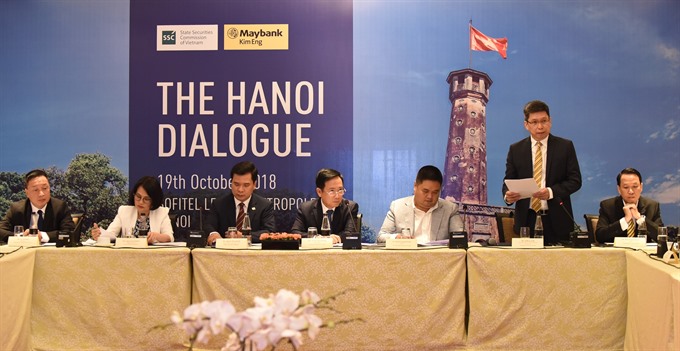Viet Nam’s securities watchdog, which disallowed companies from issuing non-voting depository receipts (NVDR) in 2015, is reconsidering the move.

Viet Nam’s securities watchdog, which disallowed companies from issuing non-voting depository receipts (NVDR) in 2015, is reconsidering the move.
The information was released by State Securities Commission (SSC) chairman Tran Van Dung in a seminar held last week.
A direct dialogue between the SSC and the representatives of 13 investment funds who are members of the Asia Trade Forum (ATF), was co-organised by SSC and Maybank Kim Eng Securities Limited Company in Ha Noi, presenting many familiar faces providing long-term investment in Viet Nam such as Dragon Capital, Vinacapital, Flanklin/Templeton HK, HSBC Global Asset HK and PXP Viet Nam Asset Management.
“We will carefully study the allowance of non-voting depository receipts submitted in the fourth quarter last year, but we are not confirming that we will approve this plan,” Dung told the seminar.
“The NVDR model does not necessarily have to be included in the Securities Law and can be dealt with by sub-law documents,” Dung said.
Three years ago the SSC had rejected the idea of allowing NVDR in Viet Nam, pointing out there was no legal framework yet for this instrument.
But the issue returned to prominence in the fourth quarter last year after a proposal from the HCM City Stock Exchange (HOSE), who argued that the appearance of NVDR would stimulate foreign trading activities in the local stock market.
The plan was first proposed by HOSE in 2013.
NVDR is a new trading instrument that would counter the fact that foreign investors who want to invest in some listed companies may be prevented from doing so by foreign ownership restrictions.
Investing in NVDRs, investors would receive the same financial benefits, including dividends, right issues or warrants, as ordinary shareholders. The only difference between ordinary shareholders and NVDR holders was the latter could not be involved in company decision-making.
If introduced in Viet Nam, they will enable the Government to sell more shares without worrying about handing control of certain sectors and companies to foreign investors.
At the seminar, participants also discussed issues such as the allowance of full foreign ownership at public companies, securities margin transactions requirements, Securities Trading Code Registration procedures, regulations on the put-through transactions on both HOSE and HNX, regulations on odd-lot trading on the HOSE and the involvement of foreign investors in IPO process in Viet Nam.
Increasing foreign net buying
Viet Nam witnessed vibrant trading transactions last year and is preparing to be upgraded to “emerging market” status from its current “frontier market” level, said Managing Director of Maybank Kim Eng Jeffrey Goh.
In the current context of escalating trade tensions between China and the US, Viet Nam will be an attractive investment destination chosen by investors to avoid risk, Goh said.
Viet Nam’s economy maintaining a growth rate of 6.7 percent, which was recently forecast by most large organisations, is very supportive information for investors, SSC Chairman Dung said.
The stock market has recorded many breakthroughs in recent years, he said. Total market capitalisation surpassed 70 per cent of the country’s GDP in 2017 and reached 80 per cent in October this year, with the benchmark VN-Index soaring by 48 per cent last year.
When the US Treasury raised interest rates in September, many foreign investment funds withdrew capital from Asian markets. However, foreign direct and indirect investment flows into Viet Nam still maintain a certain level of growth, Dung said.
SSC’s statistics have shown that from the beginning of this year to the end of October 9, net foreign inflows poured into Viet Nam were estimated at US$2.89 billion, an increase of $0.59 billion, approximately equal to the last year’s total figure of $2.92 billion.
This figure is a good sign compared to the current situation of capital withdrawal from emerging markets. From the beginning of the year, foreign investors have withdrawn from seven Asian markets including South Korea, Thailand, Indonesia, the Philippines, India, Taiwan and Malaysia with a total value of $27.34 billion.
As of October 9, the value of foreign investment portfolios was estimated at $36.3 billion, up $3.5 billion against the 2017 number of $32.8 billion.
Trading activities of foreign investors continued to be exciting recently. Particularly in September, foreign investors were net buyers of VND764 billion (US$ 32.6 million) worth of shares, fund certificates and bonds.
From early October to the end of October 9th, foreign net buying value reached VND10.2 trillion. — VNS





